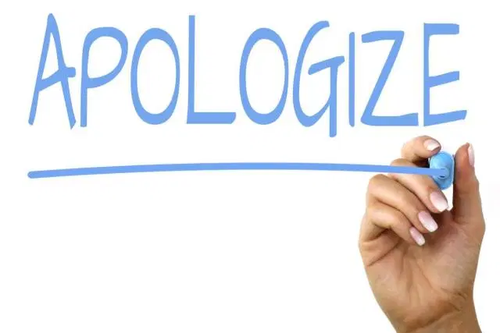If you're in a new relationship, you might be wondering to yourself, "What's the most important thing I need to know?" Conversely, maybe you've been in a relationship for a while, and you already know the answer to the question is this: how to apologize to someone you hurt.
Unfortunately, apologizing is easier said than done. It is rare for saying sorry to do the trick on its own. There is an art to apologizing and it is well worth knowing. So, if you want to be ready after that fight finally occurs with your loved one, here are 7 tips for how to apologize effectively.
1. Don't overlook the effect of this matter on your relationship

An apology should first and foremost be sincere. A good way to ensure this is the case is by honestly looking at the effect it's having on your relationship. Sure, what you were fighting about might have seemed serious, but was it really? In the context of your relationship, it's highly likely you will sound sincere when you realize how much harm a disagreement has caused you both.
2. Choose a proper time to express your apology

There are a time and place for everything; it's not just about how to apologize to someone you hurt deeply. While you may be ready to make peace with your partner, they might still need some more time to sit with their anger. We're not at our best when we are filled with emotion. So, sometimes it is best to leave things alone for a while and let both you and your partner cool down. You'll find it's a lot easier both to give and to accept an apology once things settle down and everyone has taken a breather.
3. Take responsibility for the argument... but not all of it

It takes two people to argue. If you're ready to apologize, you're clearly taking responsibility for your own actions. But that doesn't mean your partner shouldn't as well. In your apology, express exactly what you feel you did wrong. It can actually help after you tell your partner why you believe they were wrong as well, but only after you apologize first. The reason for this is that you not only want to apologize for whatever happened, but also try and help prevent the argument from happening again. The trick is to ensure your partner that, while they have a share of the blame too, you're not using that to excuse your own behavior.
4. Send the other side small gifts

Sometimes actions speak louder than words. A small gift is an excellent way of saying sorry to someone you hurt. Be careful here, though; on these occasions, the type of gift is important. Don't go overboard on price. Your partner might view it as a bribe and actually get even angrier. Instead, look for something small but sentimental. Perhaps you can find something they particularly care about or you happen to notice caught their eye recently at the store. It is the thought that counts, not the price tag.
5. Don't expect the other side to forgive you quickly

People aren't wired to just turn their emotions off instantly. Just as it takes time to calm down after a fight, it takes time for bruised feelings to heal as well. So don't expect instant forgiveness when you apologize. Your partner may still need time to reflect. If you're patient, more often than not, they'll have time to reflect on your apology and accept it wholeheartedly.
6. See the argument from the other side

It bears saying again that one of the most important parts of an apology is sincerity. One of the best ways to truly be sincere is to understand the argument from your partner's perspective. The next time you are reflecting after a fight, try the following. exercise: Pretend you are your partner and replay the argument in your head. Forget what you know, and try to see things entirely from their perspective – what they are angry about and why they don't understand your perspective.
This takes time, empathy and practice. However, really taking your partner's thoughts and feelings into consideration is not only an excellent way to learn how to apologize to someone you hurt, but it's a very, very handy way of keeping you from having fights in the first place. You'll find it much easier to keep arguments from spiraling out of control once you become good at listening to your partner and better understand their perspective.
7. You can apologize without taking the blame

This may possibly be the most important skill you can learn for apologizing to your partner. Some arguments couples have will never be resolved. Perhaps you sincerely don't feel you have anything to apologize for. Worse still, perhaps you feel like you'd be lying to your partner if you did apologize. Well, the good news is that you can still apologize without admitting you did anything wrong at all.
When you're arguing, you and your partner are understandably miserable, and you want there to be some end in sight (even if the argument truly isn't your fault). Here is a solution - you can apologize for hurting your partner.
While you may not be apologetic for what you said, you can still honestly apologize for how it made them feel. If you weren't simply arguing to hurt the other person, then this is surely true, and you can offer a real, sincere apology.
The Best Part of a Fight

The best part of a fight is making up. That being said, knowing how to apologize to someone you hurt should be a high priority in your repertoire of relationship skills. So keep your temper down and your empathy high.
Remember that, while fights will come and go, you are in a relationship that you want to last. It will likely survive the arguments as long as you keep the lines of communication open and learn when and how to truly say you're sorry.
